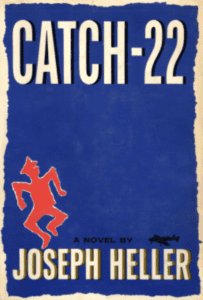Author: Joseph Conrad, a late 19th century & early 20th century Polish-British writer
An extraordinary story of a man’s lifelong quest for redemption and restoration of his honor, the narrative alternates between past and present and has two different voices, — that of the author, and of Marlow, a participant in the protagonist’s life. Tuan Jim, or Lord Jim in the language of the natives of Malay, is brave and honorable but plagued by his past. A British water-clerk in the sea ports of the east in the glory days of the empire, he calls himself only Jim. He entices the captains of ships docked in the port to visit his employer’s shop selling myriad nautical essentials and trinkets.
A parson’s son, Jim is inspired since childhood by stories of adventures at sea. He joins merchant shipping as a trainee officer, where his mettle is tested when one day it rains heavily and there is gale-force wind. A coast boat coming in for shelter crashes into a schooner anchored just ahead of his training ship on the river. Observing this, Jim’s shipmates promptly man a cutter and rush to help. Too late in responding, Jim watches others perform the acts of heroism to which he aspired since childhood. He consoles himself thinking this was not a real emergency. He would rise to the occasion and win glory at the right opportunity.
The next time Jim sees the fury of the sea before which humans are utterly powerless, he is injured by a spar falling on his leg. He spends days prostrated while the crew deals with the ravages of the storm. He is left behind in the hospital of an eastern seaport to recover. Here he notices seafarers who have an easy life sailing in local vessels ferrying shorter distances, lording it over a native crew. Jim takes a similar job as chief mate of the pilgrim steamer Patna, the disaster which haunts Jim for the rest of his life.
Jim runs away from his past wherever it becomes known, going further east each time. That past contains an act of cowardice for which Jim is stripped of his seaman’s license. The act itself is disclosed in installments. The crew of the Patna abandons the ship believing that it is about to sink, but it is later rescued by a French gunboat and towed safely to port. There are eight hundred native pilgrims on the ship and not enough lifeboats to save them all. The captain and white crew members take a lifeboat, and Jim strives to stop them. They call after another colleague still left on board, not knowing he has died, to jump onto their lifeboat. In a moment of weakness, Jim jumps in reflex hearing the call to his dead colleague to jump. Jim never forgives himself for this and faces the trial and ignominy alone, while the rest of the crew escape trial as they are either absconding or ill.
Marlow meets Jim at his trial and narrates his story first at a dinner party a few years later, and subsequently in letters to these guests. A British captain of a mercantile ship, he is not interested in the sensational scandal of the Patna, but in understanding Jim’s tortured soul. After all his romantic notions of showing unflinching courage in the face of danger, Jim finds himself sorely wanting. After the trial, Marlow gets Jim a job at a rice mill, but he leaves when an officer from Patna joins. He quits several jobs till Marlow’s friend Stein employs him to run a trading post in the Malay forests.
Jim comes to Patusan, replacing the manipulative and vindictive Cornelius. On arrival, he is imprisoned by Rajah Tunku Allang, a local leader. After three days, Jim escapes by jumping over a fence and finds his way to Doramin, the chieftain for whom Stein has sent his ring as an introduction. Doramin, a hulking man with a slight but sharp wife, is the Rajah’s greatest rival. Jim becomes a close friend of Doramin’s youthful, brave and intelligent son Dain Waris. When Marlow visits Jim two years later, he hears how Jim mounted guns atop a hill and with help from Dain Waris and Tamb’ Itam, Jim’s Malay servant, defeated the invading Sherif Ali, a half-Arab blackguard. This exploit makes Jim a legend among the Bugis people of Patusan and his word is the law. He falls in love with Cornelius’s daughter by his deceased native wife — Jewel.
Marlow later hears about Jim from a dying pirate, Gentleman Brown. Brown raids Patusan with his men for provisions when Jim is away, but Dain Waris successfully defends the settlement holding Brown trapped in a damp hollow behind a hill. Conspiring with the Rajah’s representative Kassim, Cornelius instigates Brown to kill Jim. Jim returns and speaks to Brown across the creek. Brown appeals to his conscience asking whether Jim has not done anything in the past in his darkest hour as Brown does to obtain his food. This resonates with Jim’s greatest weakness, and he promises Brown a safe passage.
Tamb’ Itam tells Marlow how Jim presents to Doramin and the Bugis the merits of showing mercy. Cornelius, carrying Jim’s message to Brown to leave at the first tide, tells him where Dain Waris is hiding on the river bank to prevent Brown from reaching his schooner anchored at sea. Brown lusts for revenge on Dain Waris who thwarted his foray. While Tamb’ Itam takes Jim’s message to Dain Waris to let Brown leave, Brown’s men land on the opposite bank guided by Cornelius. From there they shoot the unsuspecting and unprepared Bugis as well as Dain Waris. Tamb’ Itam kills the fleeing Cornelius and rushes to inform Jim. He pleads with Jim and Jewel entreats Jim to think of her, if not of himself, but Jim dismisses all his servants and surrenders to Doramin as the man who indirectly caused Doramin’s only son and heir’s death. At long last, Jim obtains redemption now, with the grieving father shooting him through the chest.




